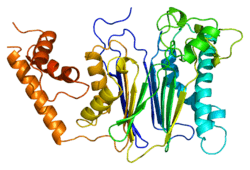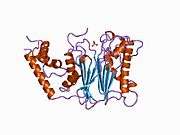PPM1A
| View/Edit Human | View/Edit Mouse |
Protein phosphatase 1A is an enzyme that in humans is encoded by the PPM1A gene.[3][4]
The protein encoded by this gene is a member of the PP2C family of Ser/Thr protein phosphatases. PP2C family members are known to be negative regulators of cell stress response pathways. This phosphatase dephosphorylates, and negatively regulates the activities of, MAP kinases and MAP kinase kinases. It has been shown to inhibit the activation of p38 and JNK kinase cascades induced by environmental stresses. This phosphatase can also dephosphorylate cyclin-dependent kinases, and thus may be involved in cell cycle control. Overexpression of this phosphatase is reported to activate the expression of the tumor suppressor gene TP53/p53, which leads to G2/M cell cycle arrest and apoptosis. Three alternatively spliced transcript variants encoding two distinct isoforms have been described.[4]
Interactions
PPM1A has been shown to interact with Metabotropic glutamate receptor 3.[5] In 2006, Dr. Feng found that PPM1A can terminate TGF-beta signaling by inactivating Smad3 via dephosphorylation. Smad3 is an essential component of the TGF-beta signalling pathway.
References
- ↑ "Human PubMed Reference:".
- ↑ "Mouse PubMed Reference:".
- ↑ Mann DJ, Campbell DG, McGowan CH, Cohen PT (Apr 1992). "Mammalian protein serine/threonine phosphatase 2C: cDNA cloning and comparative analysis of amino acid sequences". Biochim Biophys Acta. 1130 (1): 100–4. doi:10.1016/0167-4781(92)90471-b. PMID 1311954.
- 1 2 "Entrez Gene: PPM1A protein phosphatase 1A (formerly 2C), magnesium-dependent, alpha isoform".
- ↑ Flajolet, Marc; Rakhilin Sergey; Wang Hong; Starkova Natalia; Nuangchamnong Nina; Nairn Angus C; Greengard Paul (Dec 2003). "Protein phosphatase 2C binds selectively to and dephosphorylates metabotropic glutamate receptor 3". Proc. Natl. Acad. Sci. U.S.A. United States. 100 (26): 16006–11. doi:10.1073/pnas.2136600100. ISSN 0027-8424. PMC 307683
 . PMID 14663150.
. PMID 14663150.
Further reading
- Redpath NT, Price NT, Severinov KV, Proud CG (1993). "Regulation of elongation factor-2 by multisite phosphorylation.". Eur. J. Biochem. 213 (2): 689–99. doi:10.1111/j.1432-1033.1993.tb17809.x. PMID 8386634.
- Das AK, Helps NR, Cohen PT, Barford D (1997). "Crystal structure of the protein serine/threonine phosphatase 2C at 2.0 A resolution.". EMBO J. 15 (24): 6798–809. PMC 452505
 . PMID 9003755.
. PMID 9003755. - Takekawa M, Maeda T, Saito H (1998). "Protein phosphatase 2Calpha inhibits the human stress-responsive p38 and JNK MAPK pathways.". EMBO J. 17 (16): 4744–52. doi:10.1093/emboj/17.16.4744. PMC 1170803
 . PMID 9707433.
. PMID 9707433. - Fjeld CC, Denu JM (1999). "Kinetic analysis of human serine/threonine protein phosphatase 2Calpha.". J. Biol. Chem. 274 (29): 20336–43. doi:10.1074/jbc.274.29.20336. PMID 10400656.
- Hishiya A, Ohnishi M, Tamura S, Nakamura F (1999). "Protein phosphatase 2C inactivates F-actin binding of human platelet moesin.". J. Biol. Chem. 274 (38): 26705–12. doi:10.1074/jbc.274.38.26705. PMID 10480873.
- Cheng A, Ross KE, Kaldis P, Solomon MJ (2000). "Dephosphorylation of cyclin-dependent kinases by type 2C protein phosphatases.". Genes Dev. 13 (22): 2946–57. doi:10.1101/gad.13.22.2946. PMC 317162
 . PMID 10580002.
. PMID 10580002. - Strovel ET, Wu D, Sussman DJ (2000). "Protein phosphatase 2Calpha dephosphorylates axin and activates LEF-1-dependent transcription.". J. Biol. Chem. 275 (4): 2399–403. doi:10.1074/jbc.275.4.2399. PMID 10644691.
- Lifschitz-Mercer B, Sheinin Y, Ben-Meir D, et al. (2001). "Protein phosphatase 2Calpha expression in normal human tissues: an immunohistochemical study.". Histochem. Cell Biol. 116 (1): 31–9. doi:10.1007/s004180100291. PMID 11479720.
- Srivastava J, Goris J, Dilworth SM, Parker PJ (2002). "Dephosphorylation of PKCdelta by protein phosphatase 2Ac and its inhibition by nucleotides.". FEBS Lett. 516 (1-3): 265–9. doi:10.1016/S0014-5793(02)02500-0. PMID 11959144.
- Strausberg RL, Feingold EA, Grouse LH, et al. (2003). "Generation and initial analysis of more than 15,000 full-length human and mouse cDNA sequences.". Proc. Natl. Acad. Sci. U.S.A. 99 (26): 16899–903. doi:10.1073/pnas.242603899. PMC 139241
 . PMID 12477932.
. PMID 12477932. - Ofek P, Ben-Meir D, Kariv-Inbal Z, et al. (2003). "Cell cycle regulation and p53 activation by protein phosphatase 2C alpha.". J. Biol. Chem. 278 (16): 14299–305. doi:10.1074/jbc.M211699200. PMID 12514180.
- Matsuda A, Suzuki Y, Honda G, et al. (2003). "Large-scale identification and characterization of human genes that activate NF-kappaB and MAPK signaling pathways.". Oncogene. 22 (21): 3307–18. doi:10.1038/sj.onc.1206406. PMID 12761501.
- Flajolet M, Rakhilin S, Wang H, et al. (2004). "Protein phosphatase 2C binds selectively to and dephosphorylates metabotropic glutamate receptor 3.". Proc. Natl. Acad. Sci. U.S.A. 100 (26): 16006–11. doi:10.1073/pnas.2136600100. PMC 307683
 . PMID 14663150.
. PMID 14663150. - Ota T, Suzuki Y, Nishikawa T, et al. (2004). "Complete sequencing and characterization of 21,243 full-length human cDNAs.". Nat. Genet. 36 (1): 40–5. doi:10.1038/ng1285. PMID 14702039.
- Yoshizaki T, Maegawa H, Egawa K, et al. (2004). "Protein phosphatase-2C alpha as a positive regulator of insulin sensitivity through direct activation of phosphatidylinositol 3-kinase in 3T3-L1 adipocytes.". J. Biol. Chem. 279 (21): 22715–26. doi:10.1074/jbc.M313745200. PMID 15016818.
- Gerhard DS, Wagner L, Feingold EA, et al. (2004). "The status, quality, and expansion of the NIH full-length cDNA project: the Mammalian Gene Collection (MGC).". Genome Res. 14 (10B): 2121–7. doi:10.1101/gr.2596504. PMC 528928
 . PMID 15489334.
. PMID 15489334. - Li D, Wang F, Lai M, et al. (2005). "A protein phosphatase 2calpha-Ca2+ channel complex for dephosphorylation of neuronal Ca2+ channels phosphorylated by protein kinase C.". J. Neurosci. 25 (8): 1914–23. doi:10.1523/JNEUROSCI.4790-04.2005. PMID 15728831.
- Rual JF, Venkatesan K, Hao T, et al. (2005). "Towards a proteome-scale map of the human protein-protein interaction network.". Nature. 437 (7062): 1173–8. doi:10.1038/nature04209. PMID 16189514.
- Kitajima TS, Sakuno T, Ishiguro K, et al. (2006). "Shugoshin collaborates with protein phosphatase 2A to protect cohesin.". Nature. 441 (7089): 46–52. doi:10.1038/nature04663. PMID 16541025.



